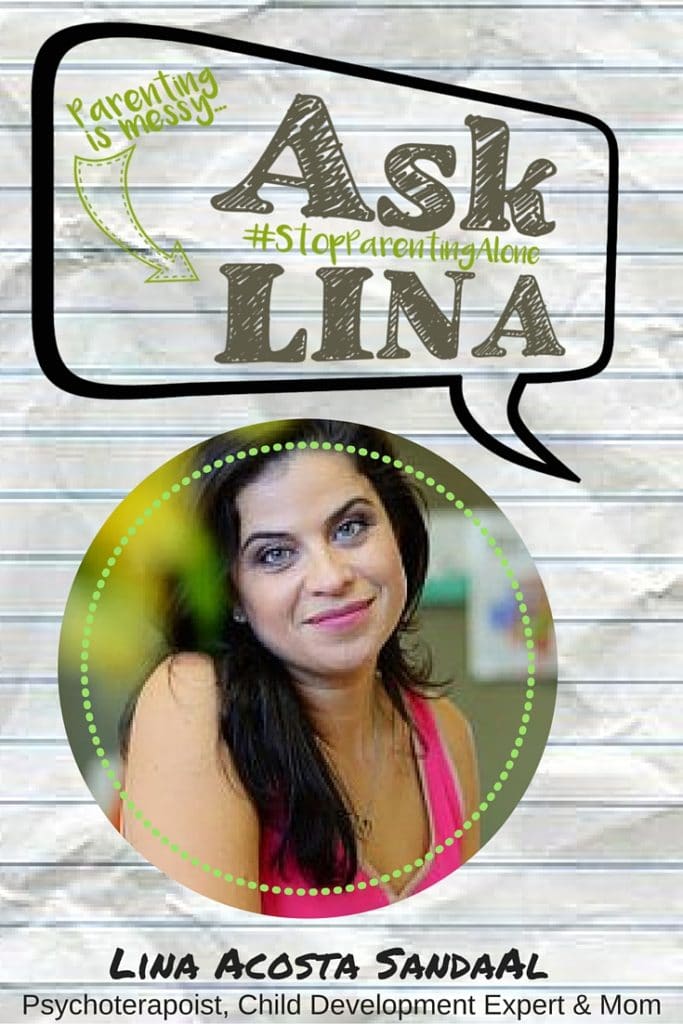“Ask Lina” is a special editorial series where we invite you to send us your parenting questions in the comments below and our teen & tween emotional expert, Lina Acosta Sandaal, gives you tips that will help you navigate these crucial “in-between years.”

Cristy Clavijo-Kish, creator & publisher of “Los Tweens & Teens,” with her tween daughters, Sophia & Olivia
For many parents, raising the ‘sex’ topic with their growing children is one of the hardest challenges they have to face in their parenting journey. I receive questions from parents or guardians on a consistent basis on this topic–when to bring it up, how to answer questions, what is the proper age, etc.
It seems that for Latina moms it is even more complex, as our community faces many taboos when it comes to being open about sex education.
There is an underlying correlation between talking about sex and promoting the activity among young adults. I feel that talking about sex and including abstinence in the discussion is just as important. I’ve asked my friends who are not Latina, and Asian moms have told me they struggle similarly!
Questions from kids begin as early as the fourth and fifth grades when body changes start becoming more noticeable for both boys and girls. So while your kids aren’t even 10 years old and still may be watching Barbie movies and building Legos, they also have questions about what they’re feeling or how to manage their new bodies.
As my own family navigates these difficult waters I decided to turn to our expert Lina Acosta-Sandaal from The Nest Miami for guidance. I was looking for age-appropriate tips to help prepare myself mentally for replying to their questions or raising the topic that my kids may be thinking, but aren’t asking.
-Cristy
For tips on sex-questions from TEENS, please click HERE.

To soothe your fear and discomfort with the topic of sex remember that we develop sexually from the moment we are born, and in this manner it should be approached like when you taught them to walk, eat, go to school, bathe. Here are healthy sexual development markers:
Kinder-4th grade:
- Shows others their genitals.
- Interested in urination and defecation.
- Thinks others genital are “gross” or that they have “cooties.”
- Talks about sex with friends.
- Likes to hear and use “dirty” words.
- Compares genitals with peer-aged friends.
- Menstruation as early as 9 years old. (Best practice is to talk to them about menstruation before it happens.)
Middle-school- adolescence:
- The body matures faster than the emotional and intellectual abilities causing confusion.
- Secondary sex traits like breasts and pubic hair begin in girls between 7 and 14 years of age and in boys between 9 and 17 years of age.
- Males begin masturbating between 13 and 15 years of age.
- The onset of masturbation for females is gradual.
- The median age of first intercourse for boys is 16.9 and girls is 17.4.
- At least one third of young women become pregnant at least once before they reach the age of 20.
- About 73% of teens think sex is ok between consenting unmarried adults.
- 2-10 % of the population realize their homosexuality in their teenage years. Due to negative societal attitudes about LGBTQ community, most gay, lesbian and bi-sexual teens suffer a great deal of emotional pain.
- The most significant predictor of sexual intercourse between teenagers is alcohol and drug use, the presence of a boyfriend or girlfriend and poor parental monitoring.
To answer the question of what to say and how to say it, here is a handy list:

- Arm your children with knowledge and self-confidence as it pertains to sex. Studies show that this will inform their decisions and direct their sexual destinies. This age group needs to understand the biology of sex; yes, you have to talk about vagina, penis, and intercourse, as well as the future changes in their body as it pertains to puberty.
- Speak openly about your values and your expectations as it pertains to sex.
- Continue to build their self-esteem. Due to the increase in conflict during the tween years it can be difficult to remember to continue to build up your child for all of their skills, kindness, and appearance.
- The cellphone is now part of the discussion when it comes to sex and safety. It is recommended to not give a phone with data capability until a child is over 13 or is mature enough to not impulsively use the data plan.
For tips for teens ages 12-17 please click HERE.
To read more “Ask The Nest” posts, please click HERE.
—
Have a tween/teen parenting question for “The Nest?” Great! You can add your question in the comments below and Lina will be happy to answer in a future post.

Lina Acosta Sandaal, MA, LMFT is a psychotherapist, child development expert and founder of Stop Parenting Alone, a parenting and therapy center in Miami, FL. She is the parenting expert on Telemundo’s national morning show Un Nuevo Dia, a co-chair from the Florida Maternal Mental Health Collaborative and a consultant for MomsRising, a national organization advocating for children and family rights
